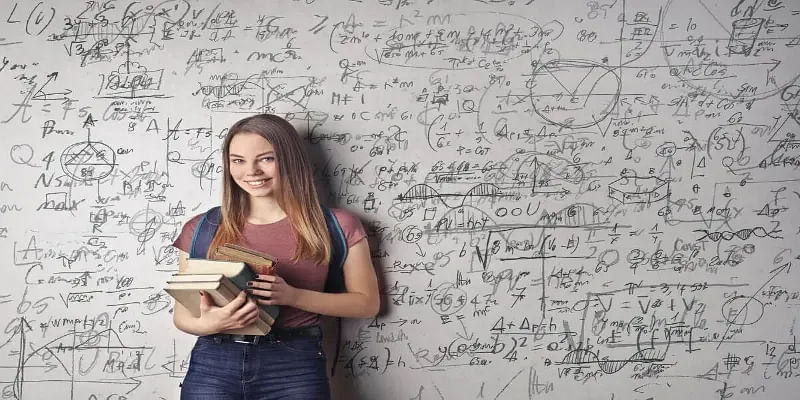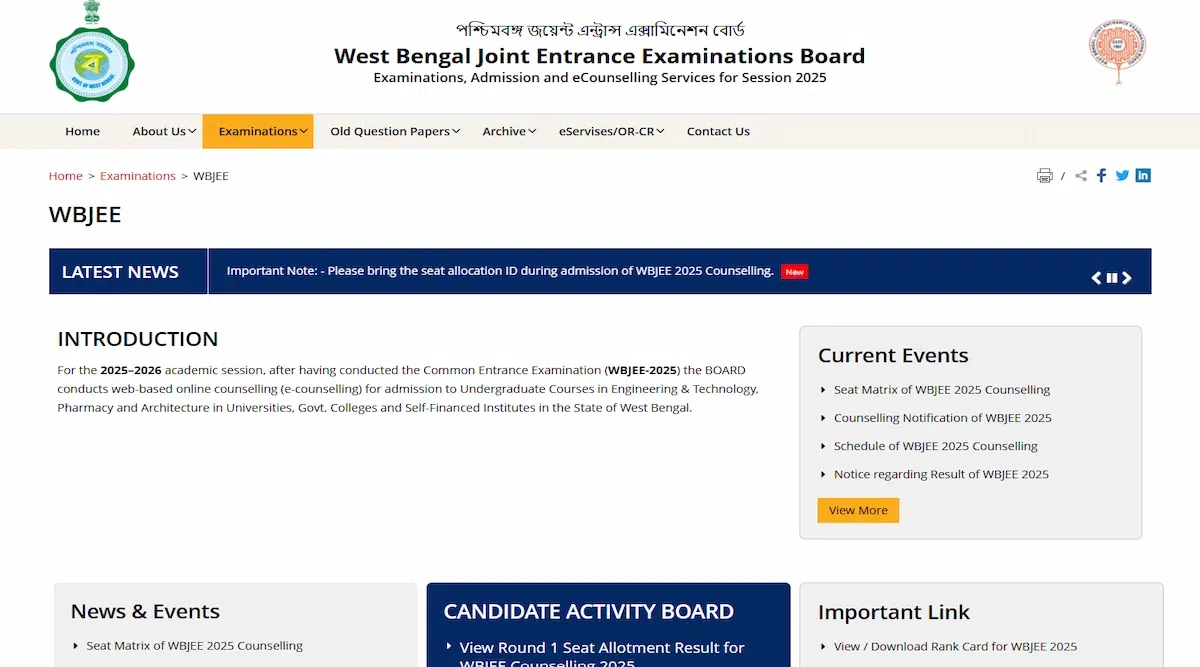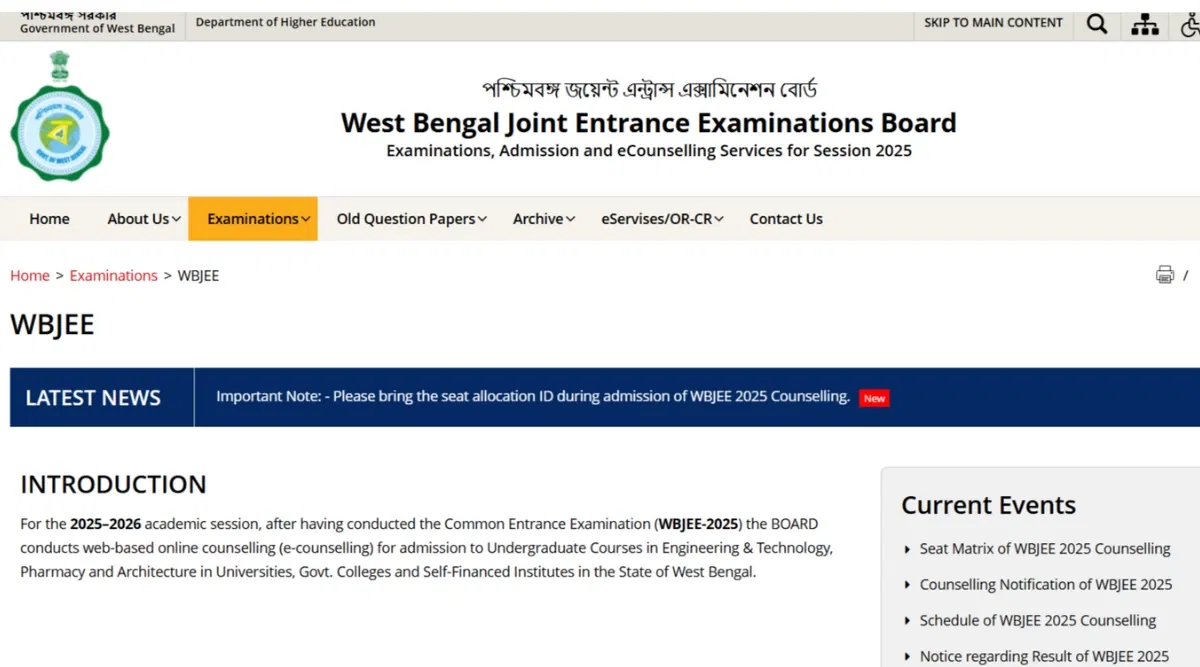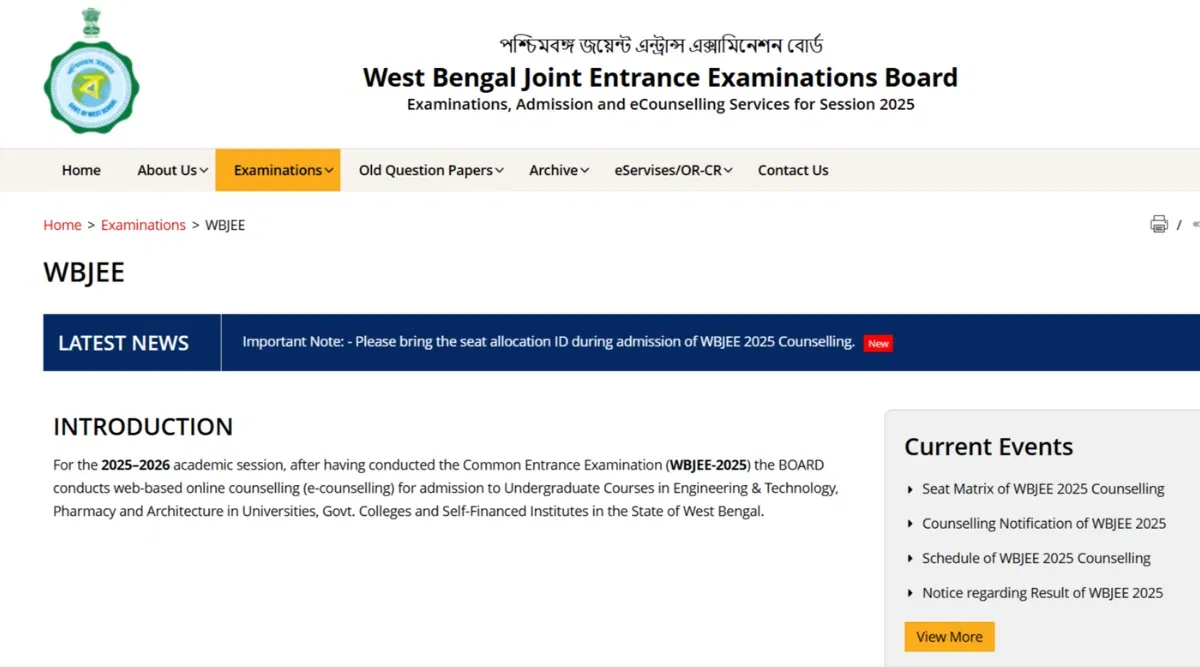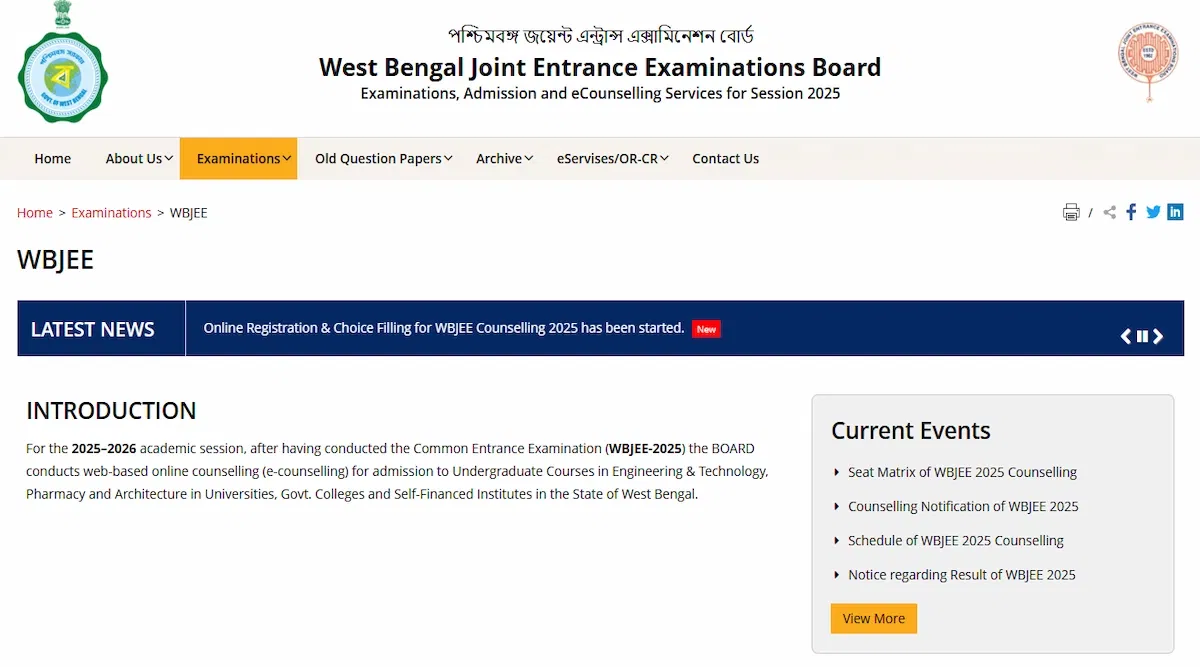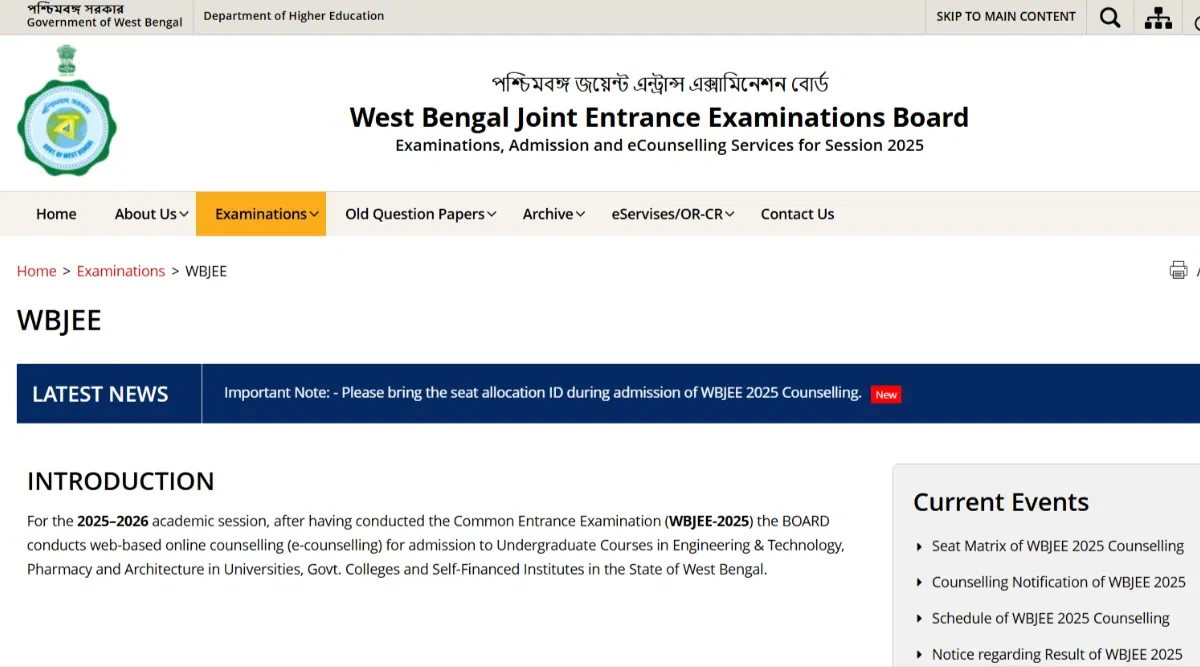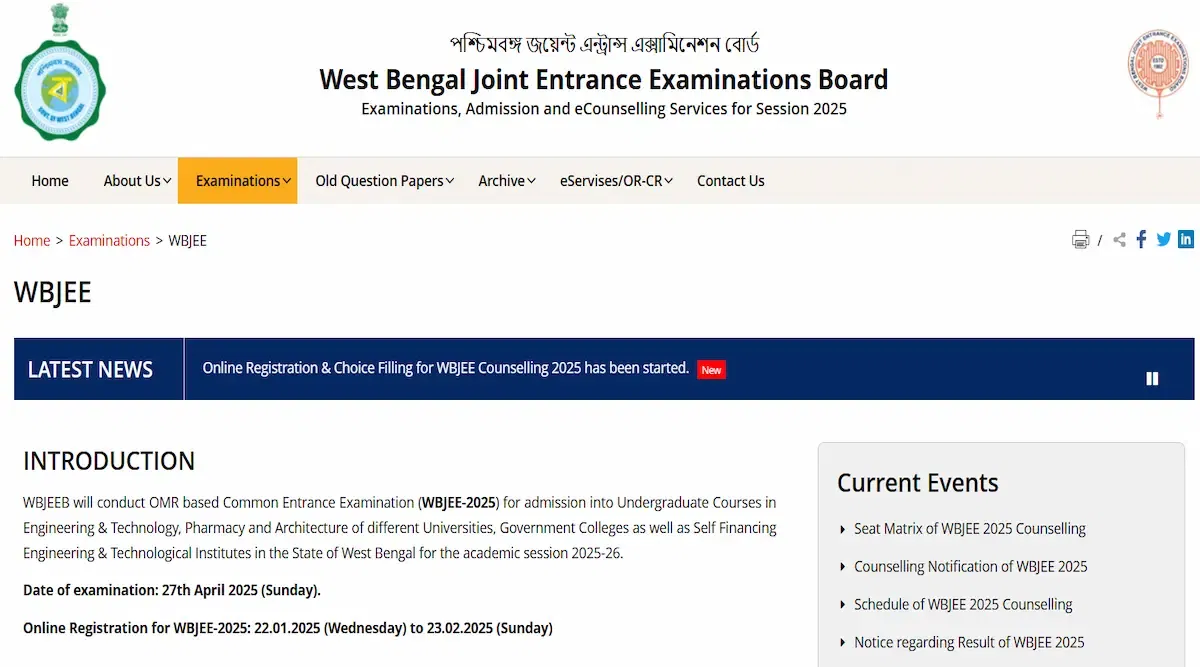
Table of Contents
WBJEE Mathematics Syllabus 2025 covers important topics such as Algebra, Complex Numbers, Binomial Theorem, Matrices, Statistics, Probability, Trigonometry, Coordinate Geometry, and Calculus. The Mathematics Syllabus PDF for WBJEE Exam will soon be made available for download on the official website.
The WBJEE Syllabus 2025 for Mathematics is based on the Class XI and XII syllabus. The important topics and sub-topics included in the WBJEE Maths syllabus 2025 are discussed on this page. An overview of the chapter-wise weightage for WBJEE Maths is also given to help the students prepare extensively for the exam.
WBJEE Maths Syllabus PDF 2025
Students can download the WBJEE 2025 Mathematics Syllabus PDF from the link below. The PDF contains all the topics and sub-topics in depth that students must prepare for the WBJEE 2025 exams:
|
WBJEE Mathematics Syllabus PDF 2025 |
Practice Now: WBJEE Previous Year Question with Solution
WBJEE Mathematics Syllabus 2025
The WBJEE Syllabus for Mathematics is given below. Students can review the Maths syllabus topics in detail. Any changes in the WBJEE Mathematics Syllabus 2025 will be updated below:
Algebra:
- Definitions of a.p., G.p., and H.p. General Terms
- Summation of First N-terms for Series ∑n, ∑n², ∑n³.
- The Arithmetic and Geometric Series. A.m., G.m., and Their Relation.
- The Infinite G.p. Series & Its Sum
Logarithms:
Definition, the General Properties, the Change of Base.
Complex Numbers:
- The Definition in Terms of Ordered Pair of Real Numbers.
- The Properties of Complex Numbers.
- The Complex Conjugate; Triangle Inequality.
- The Amplitude of Complex Numbers.
- The Square Root and Cube Roots of Unity.
- The De Moivre's Theorem (Statement Only) With Elementary Applications.
- The Solution of Quadratic Equations in Complex Number Systems
Polynomial Equation:
- The Nth Degree Equation Has Exactly N Roots (Statement Only).
- Quadratic Equations.
- The Real Coefficients; Relations Between Roots & Coefficients; The Nature of Roots
- The Formation of a Quadratic Equation.
- Sign & Magnitude of the Quadratic Expression Ax² + Bx + C ( a, B, C Are Rational Numbers & a ≠ 0)
Permutation & Combination:
- The Permutation of N Different Things Taken R at a Time.
- The Permutation of N Things Not All Different.
- The Permutation With Repetitions Excluded.
- The Combinations of N Different Things Taken R at a Time.
- The combination of N Things Not All Different.
- The Basic Properties.
- Problems Involving Permutations and Combinations
Principle of Mathematical Induction:
- Statement: The Proof by Induction for the Sum of Squares, the Sum of Cubes of First N Natural Numbers.
- The Divisibility Properties Like 2^(2n) – 1 Divisible by 3 (N ≥ 1), 7 Divides 3^(2n+1) + 2^(2n+2) (N ≥ 1)
Binomial Theorem (Positive Integral Index):
- Statement: The General Term, the Middle Term.
- The Equidistant Terms, The Properties of Binomial Coefficients.
Matrices:
- The Concepts of M X N (M ≤ 3, N ≤ 3) Real Matrices.
- The Operations of Addition, Scalar Multiplication, and Matrix Multiplication.
- The Transpose of a Matrix. Determinant of a Square Matrix.
- The Properties of Determinants.
- The Minor, Cofactor, & Adjoint of Matrix; Non-singular Matrix.
- The Inverse of Matrix; Finding the Area of a Triangle.
- The Solutions of the System of Linear Equations
Sets, Relations & Mappings:
- The Idea of Sets, Subsets, Power Sets, Complement, Union, Intersection, & Difference of Sets.
- Venn Diagram- De Morgan's Laws- the Inclusion/exclusion Formula for Two or Three Finite Sets.
- The Cartesian Product of Sets
- Relation & Its Properties. Equivalence Relation — Definition & Elementary Examples.
- Mappings, Range, & Domain
- Injective, Surjective, & Bijective Mappings
- Composition & Inverse of Mapping
Statistics & Probability:
- The Measure of Dispersion, Mean, Variance, and Standard Deviation
- Frequency Distribution. Addition & Multiplication Rules of Probability
- Conditional Probability & the Bayes’ Theorem, Independence of Events
- The Repeated Independent Trials & Binomial Distribution
Trigonometry:
- Trigonometric Functions. Addition & Subtraction Formulas
- Formulae Involving Multiple and Submultiple Angles
- The General Solution of Trigonometric Equations
- The Properties of Triangles
- Inverse Trigonometric Functions & Their Properties
Coordinate Geometry of 2D:
- Distance Formula, Section Formula, Area of a Triangle
- The Condition of Collinearity of Three Points in Plane
- The Polar Coordinates, the Transformation From Cartesian to Polar Coordinates & Vice Versa.
- The Parallel Transformation of Axes.
- The Concept of Locus-locus Problems Involving All Geometrical Configurations.
- The Slope of a Line- the Equation of Lines in Different Forms- the Angle Between Two Lines.
- The Condition of Perpendicularity & Parallelism of Two Lines
- The Distance of a Point From a Line
- The Distance Between Two Parallel Lines, the Lines Through the Point of Intersection of Two Lines.
- Angle Bisector.
- The Equation of a Circle With a Given Center and Radius
- The Condition That General Equation of Second Degree in X & Y May Represent a Circle.
- The Equation of a Circle in Terms of Endpoints of a Diameter
- The Equation of Tangent, Normal, & Chord
- The Parametric Equation of a Circle
- The Intersection of a Line With a Circle
- The Equation of Common Chord of 2 Intersecting Circles; the Definition of Conic Section, Directrix, Focus & Eccentricity, Classification Based on Eccentricity
- The Equation of Parabola, Ellipse & Hyperbola in Standard Form
- Their Foci, Directrices, Eccentricities, & Parametric Equations
Coordinate Geometry of 3D:
- Direction Cosines & Direction Ratios.
- The Distance Between Two Points & Section Formula.
- The Equation of a Straight Line
- The Equation of a Plane
- The Distance of a Point From a Plane
Differential Calculus:
- The Functions, Domain & Range Set of Functions
- The Composition of Two Functions & Inverse of a Function
- Limit, Continuity, Derivative, Chain Rule, & Derivative of Functions in Various Forms; Concept of Differential; Rolle's Theorem and Lagrange's Mean Value Theorem (Statement Only)
- The Geometric Interpretation and Elementary Application. L'hospital's Rule & Applications
- Second Order Derivatives. Integral Calculus: Integration as Reverse Process Differentiation
- The Indefinite Integral of Standard Functions.
- Integration by Parts, Substitution, & Partial Fraction.
- The Definite Integral as a Limit of Sum With Equal Subdivisions
- The Fundamental Theorem of Integral Calculus & Its Applications; the Properties of Definite Integrals.
Differential Equations:
- The Formation of Ordinary Differential Equations
- The Solution of Homogeneous Differential Equations
- The Separation of Variables Method; Linear First Order Differential Equations
Application of Calculus:
- The Tangents and Normals
- The Conditions of Tangency
- The Determination of Monotonicity, Maxima, and Minima
- The Differential Coefficient as Measure of Rate
- Motion in a Straight Line With Constant Acceleration
- The Geometric Interpretation of Definite Integral as Area
- Calculation of Area Bounded by Elementary Curves & Straight Lines; the Area of the Region Included Between Two Elementary Curves
Vectors:
- The Addition of Vectors
- Scalar Multiplication, Dot and Cross Products; Scalar Triple Product
Don't Miss: How to prepare for WBJEE in 3 months?
Important Topics in the WBJEE 2025 Mathematics Syllabus
To prepare for the WBJEE exam, students must focus on the important topics from the Mathematics WBJEE syllabus 2025. The exam is based on the syllabus of Class XI and XII levels.
The Mathematics section of the WBJEE exam paper consists of 75 questions, comprising 100 marks. Therefore, students should concentrate on the important WBJEE Mathematics topics and subtopics to prepare for the exam. Some of the crucial topics include:
- Complex Numbers
- Matrices
- Permutation and Combination
- Polynomial Equation
- Probability
- Sets
- Algebra
- Definite Integration
- Limits
- Vectors
- Binomial Theorem
- Relations and Mapping
- Coordinate Geometry
Also Read: How to prepare for WBJEE in 1 Month?
WBJEE Maths Weightage 2025
For better results in the WBJEE exams, students must know the weightage of the WBJEE Mathematics syllabus topics. A higher weightage means that the topic has more chances of appearing in the exam.
The WBJEE chapter-wise weightage 2025 for Mathematics is given below. Students must not skip any of these topics that carry a high weightage:
|
Important Topics |
Chapterwise weightage |
|
Vectors |
7% |
|
Probability |
7% |
|
Coordinate Geometry |
6% |
|
Matrices & Determinants |
5% |
|
Limits |
5% |
|
Indefinite Integration |
5% |
|
Sets, Relation & Functions |
5% |
|
Definite Integration |
5% |
|
Theory of Equations |
4% |
|
Permutation & Combination |
4% |
|
Complex Numbers |
4% |
WBJEE Mathematics Books 2025 for Preparation
For effective preparation, students are advised to refer to top WBJEE reference books. These books help students understand the concepts in depth and provide practice questions from the WBJEE Mathematics Syllabus 2025. The following is the list of important WBJEE Mathematics syllabus books:
|
Books |
Author |
NCERT |
|
|
Mathematics |
R.S. Agarwal |
|
WBJEE |
Arihant Publications |
|
Handbook Mathematics |
|
|
Calculus |
I.A. Maron |
|
Problem Book in Mathematical Analysis |
G.N. Berman |
|
Mathematics (Class XI and XII) |
R.D. Sharma |
|
Course in Mathematics |
K.R. Choubey |
WBJEE Mathematics Books 2025 for Preparation
For effective preparation, students are advised to refer to the following books. These books help students understand the concepts in depth and provide practice questions from the WBJEE Mathematics Syllabus 2025.
| Books | Author |
| NCERT Class XI Mathematic | NCERT |
| NCERT Class XII Mathematics | |
| Mathematics | R.S. Agarwal |
| WBJEE | Arihant Publications |
| Handbook Mathematics | |
| Calculus | I.A. Maron |
| Problem Book in Mathematical Analysis | G.N. Berman |
| Mathematics (Class XI and XII) | R.D. Sharma |
| Course in Mathematics | K.R. Choubey |
Preparation Tips for WBJEE Mathematics Syllabus 2025
Students are advised to follow the WBJEE preparation tips listed below to prepare well for WBJEE Maths 2025:
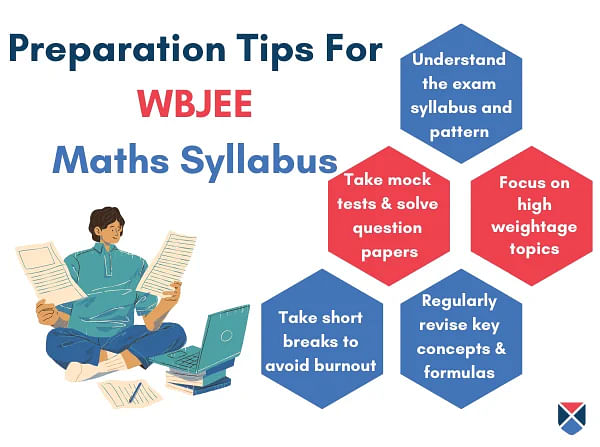
- Use WBJEE Maths Weightage 2025 and the syllabus of WBJEE to focus on essential topics.
- Study the WBJEE exam pattern 2025 to create a plan with proper time allocation for topics.
- Practice WBJEE previous year’s question papers to identify crucial units.
- Utilize video tutorials available online on YouTube and educational websites to understand concepts.
- Include a notebook for equations and formulas.
- Solve WBJEE mock test 2025 to improve speed and precision.
- Balance study periods with resting periods to manage stress.
Read More: WBJEE preparation 2025

























